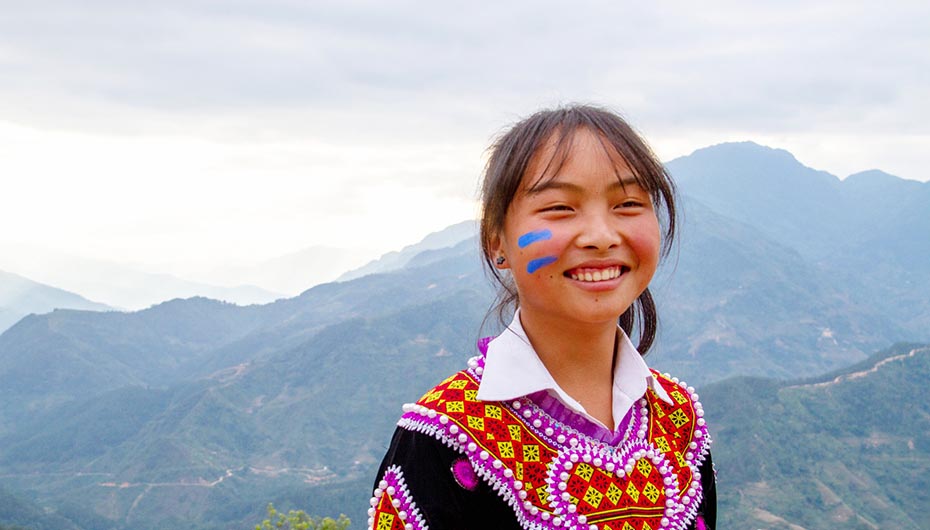Media Centre - Media release - 2 March 2020
New girls’ leadership research highlights the urgent need for the Australian Government to recommit to aid and development in South Asia and South East Asia

Media contact: Claire Knox, 0452 326 549/ [email protected].
Interviews with Plan International Australia CEO Susanne Legena and Director of Programs Dave Husy are available.
Full report and case studies can be downloaded here; images can be downloaded here.
Plan International today launched the 2020 Asia Girls’ Report & Asia Girls Leadership Index, a new body of research highlighting the unfinished work of addressing entrenched gender inequality faced by millions of girls in countries including Cambodia, Vietnam, Pakistan and the Philippines.
The report focuses on the progress being made to achieve gender equality for adolescent girls in Asia and ranks 19 countries in South and Southeast Asia across six key domains including girls’ education, economic empowerment and health. The report provides a clear picture of the systemic barriers facing girls in Asia, highlighting key areas where future investment is required; particularly in countries that Australia has strong bilateral relations with. Alarmingly, the research has revealed that that no country in Asia – despite being home to more than half of the world’s 1.1 billion girls under the age of 18 – is set to achieve the UN’s Sustainable Development Goal of gender equality by 2030.
Launched ahead of International Women’s Day, the research and Index comes at the same time Australian aid to Southeast Asian countries has fallen by 42 per cent. Aid to Indonesia and Vietnam has been cut in half over the past five years while aid for Cambodia fell by 33 per cent. Aid to Laos was cut by 41 per cent and to the Philippines by 44 per cent.
The Index, however, has shown that girls and young women in these countries still face huge barriers when it comes to education, economic opportunity, protection, health, political voice, and legal standing. Plan International Australia urges the Government to recommit to aid and development in South Asia and South East Asia through its new international development policy.
“Australia is a global leader in advancing gender equality and we would like to see that continue. However with a shrinking budget for education and health in South Asian and South East Asian countries, we are concerned that it’s girls that will suffer” said Plan International Australia CEO, Susanne Legena.
“Our 2020 Asia Girls’ Report & Asia Girls Leadership Index shows that in ‘middle income’ countries like Vietnam, girls still face high levels of gender-based violence.
“In countries such as Cambodia, girls are still struggling to access sexual and reproductive health services and adolescent pregnancy rates are actually increasing rather than falling.”
The Index has uncovered that out of the 19 countries surveyed, Cambodia was ranked 17th in terms of girls’ access to secondary education, with the lowest rates in ASEAN for both secondary school completion and tertiary education enrolment rates for girls.”
Cambodia also has the highest female youth labour participation rate in the region, suggesting economic participation for young women may be coming at the expense of – rather than as a result of – quality secondary and tertiary education opportunities.
Deeper Index data analysis shows that even countries that performed well overall have considerable work to do in specific areas. Singapore, although in first place generally, ranks behind most of ASEAN when it comes to laws and policies that guarantee rights.
“Our international development program plays an important role in addressing these difficult issues,” Ms Legena said.
Findings of the Index:
- Secondary school completion does not equate to tertiary enrolment; while the top 14 ranked countries in secondary school completion indicator reported more than 80% completion rate, only Singapore reported more than 80% enrolment in tertiary education.
- Cambodia ranks in the top five for economic opportunity but ranks in the bottom five for education.
- Countries with a high GDP are not performing better in all areas of economic opportunity – Singapore ranks behind Timor-Leste for young female labour participation.
- Philippines needs to tackle teen pregnancy and access to birth control. The Philippines ranks second highest overall but 12th in the health domain.
- Only Philippines and Vietnam have in place all five pieces of legislation that are used as indicators for the Laws and Policies domain.
- Timor-Leste leads in political voice and representation but lags in health and domestic violence.
Aid cuts by the Coalition Government in 2016 led to the cancellation and closure of a range of Plan International Australia’s life-saving aid projects in poverty stricken locations including Cambodia, Vietnam, Indonesia, Bangladesh, Zambia and Ethiopia with catastrophic consequences for the world’s poor.
“Plan International has seen the impact of these cuts first hand. We have been forced to end several highly successful programs, including programs tackling gender based violence in East Africa, as a result of savage cuts to the aid budget over a number of years,” Ms Legena said.
“These projects were formerly funded by the Australian government. They combatted child marriage, provided kindergartens for preschool students and funded climate change coping mechanisms for children, who face increased risk in a climate unstable world. Budgets for these programs were cut with little or no warning, and even in the middle of project,” she added.
Plan International Australia has made a submission to the current review of Australia’s new International Development Policy. Just some of its recommendations include:
- Strengthening state-society relationships with young people as key partners and emerging leaders; recognising and responding to the impacts of climate change by empowering children and young people – especially young women – to be climate change leaders
- Ensuring children and young people in the Pacific fully realise the benefits of Australia’s infrastructure investments such as greater internet access
- Protecting children and young people in the Pacific by improving their safety, both online and offline
- Promoting young people’s economic empowerment through gender transformative and inclusive vocational training and entrepreneurship programs.
Australia’s new International Development Policy is an opportunity to reaffirm our commitment to working alongside our neighbours in Asia to tackle the unfinished business of achieving gender equality. Plan International Australia is looking forward to its recommendations being taken into consideration.
About Plan International Australia
Put simply, we’re the charity for girls’ equality. We tackle the root causes of poverty, support communities through crisis, campaign for gender equality, and help governments do what’s right for children and particularly for girls. We believe a better world is possible. An equal world; a world where all children can live happy and healthy lives, and where girls can take their rightful place as equals.
Media contacts


